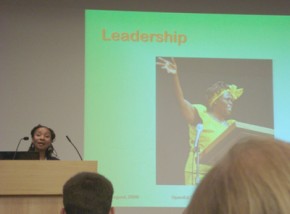OER in Africa: A Sea Change?
The 2009 Open Education Conference officially kicked off with a keynote presentation by Catherine Ngugi, Project Director for Open Educational Resources (OER) Africa. OER Africa was started in February 2008, and is headquartered in Nairobi under the auspices of SAIDE. It was established to play a leading role in driving the development and use of OERs in Africa.
Catherine noted that of late, the African higher education system has faced some major problems. Higher education institutions are underfunded, faculty are being stretched thin (often faculty are lecturing to 200 students when the class is meant for a class of 50), there are few learning resources, there is a limited IT infrastructure to gain access to up to date information available on the Internet, there are insufficient and costly bandwidth issues (Internet hotspots are not always around faculty offices), and many of the brightest intellectuals are teaching off of the continent. Open educational resources are seen as a way to help alleviate some of these problems. Catherine maintained that OER Africa will help with the free and open development and sharing of common intellectual capital. She hopes that it will also aid educational institutions in developing the future intellectual capital of Africa, which would help build and sustain the economy and African societies.
 Catherine showcased the OER efforts by going through a case study. She told the story about a community funded primary school which had adopted open educational resources. Janister, the teacher had used OERs to show students how to collaborate, develop a view of the other (by completing a project where students wrote a story about how they were an animal like a hyena or crocodile), and value the opinions of others through interactive learning. By using the OERs available on the Teacher Education in Sub Saharan Africa (TESSA) website, Janister was able to expose her students to a new way of thinking which is not common in other African primary schools.
Catherine showcased the OER efforts by going through a case study. She told the story about a community funded primary school which had adopted open educational resources. Janister, the teacher had used OERs to show students how to collaborate, develop a view of the other (by completing a project where students wrote a story about how they were an animal like a hyena or crocodile), and value the opinions of others through interactive learning. By using the OERs available on the Teacher Education in Sub Saharan Africa (TESSA) website, Janister was able to expose her students to a new way of thinking which is not common in other African primary schools.
In another example, Catherine talked about how she visited another primary school where its students had built a weather station. The students had learned about the weather by building their small, and very simple weather station. The weather station was an example of learning by doing and problem based learning, something that would not have been possible had the teacher not been exposed to the TESSA website and the OER resources available on it. Another great example of how learning does not have to come from a textbook.
Catherine also mentioned that OER Africa has the potential to reduce the cost of accessing educational materials and will allow African professors to adapt materials to their teaching pedagogies. Its mission is to establish vibrant networks of African OER practitioners by connecting like-minded professors across the continent. She sees OER Africa as a bridge to improving and enriching the landscape of higher education.
Catherine then showed a video about a collaborative health OER network that had developed between OER Africa and the University of Michigan. Professors and students shared their experience with using OERs in the classroom, and the results were positive. One professor wondered “if we have information, why don’t we share it?”Another professor noted that having his lecture material available to students online will enable them to read notes before and after class and “ask better questions”. A student mentioned that she found the video OERs of great use, as they augmented what she saw at the lectures. With video demonstrations, there is the ability to zoom in and rewind – something which is very useful for students to review after class when live demonstrations often have 20 students crowded around a single professor, all trying to see the intricacies of the demonstration. A professor thought that by opening “ourselves out to the rest of the world…the rest of the world can judge whether we are teaching the right thing or wrong thing.” In a way, OERs lead to constructive criticism and feedback, something that can make the teaching material even better.
To conclude, Catherine noted that OERs are proof that a sea of change can happen in Africa. Higher education should provide a place to meet others, experience new ways of learning, and produce graduates with the ability to self-reflect. Quite simply, OERs work best when people are collaborating. Currently, OER Africa is still building awareness of OER use in Africa, and why faculty should use and create them.
How can you help? After her keynote address, Dave Cormier met up Catherine and they created a twitter account, findanoerafrica, to send out requests to the open education community for help finding appropriate resources. If you have twitter, all you have to do is follow findanoerafrica and respond in any helpful way that you can if they tweet about a resource that they are looking to find. It’s just another way where members of the open education community can make a difference by sharing information they already have.

